When the Explorers made their landfall on Easter Island
it was in the first day of the Sun month of 'Maro' (i te raa po rae
o te.maro.) and this was probably not literally in June 1.
Instead the preceding first month names Vaitu Nui (Much
Water, April) and Vaitu Potu (Little Water, May) was like
a pair of islets standing in sweet water and they should
have implied Dry (Land, Terra Firma) was quickly approaching.
|
Rae
First (always follows the noun): te
tagata ra'e, the first man; (the other ordinal
numerals, second, third, etc., precede the noun.
Translator's note: ra'e is likely the noun which
means forehead, face, in other Polynesian language, e.g.
Tahitian rae). Vanaga.
1. Commencement, beginning, to strike
up, to essay, to occasion, to proceed, former,
primitive, precedent, predecessor, first-fruits; rae
ki te mea hou, to innovate; oho rae, to march
at the head; tagata rae, advance guard, van;
raega, commencement, beginning, occasion,
first-fruits. 2. To attack, to provoke; kakai rae,
toua rae, to provoke. Churchill. |
| Maro
Maro: A sort of small banner or
pennant of bird feathers tied to a stick. Maroa:
1. To stand up, to stand. 2. Fathom (measure). See
kumi. Vanaga.
Maro: 1. June. 2. Dish-cloth T
P Mgv.: maro, a small girdle or breech clout.
Ta.: maro, girdle. Maroa: 1. A fathom;
maroa hahaga, to measure. Mq.: maˇ, a fathom.
2. Upright, stand up, get up, stop, halt. Mq.: maˇ,
to get up, to stand up. Churchill. Pau.: Maro,
hard, rough, stubborn. Mgv.: maro, hard,
obdurate, tough. Ta.: mÔr˘, obstinate,
headstrong. Sa.: mālō,
strong. Ma.: maro,
hard, stubborn. Churchill.
Ta.:
Maro,
dry, desiccated. Mq.: mao,
thirst, desiccated. Fu.: malo,
dry. Ha.: malo,
maloo,
id. Churchill.
Mgv.:
Maroro,
the flying fish. (Ta.: marara,
id.) Mq.: maoo,
id. Sa.: malolo,
id. Ma.: maroro,
id. Churchill. |
|
... The fish came
near the surface then, so that Maui's line was slack for a
moment, and he shouted to it not to get tangled.
But then
the fish plunged down again, all the way to the bottom. And
Maui had to strain, and haul away again. And at the height
of all this excitement his belt worked loose, and his
maro fell off and he had to kick it from his feet.
He had to do the rest
with nothing on ... |
|
... The dream
soul of Hau Maka continued her journey and,
thanks to her mana, reached another land. She
descended on one of the small islets (off) the coast.
The dream soul of Hau Maka looked around and
said: 'These are his three young men.' She named the
three islets 'the handsome youths of Te Taanga,
who are standing in the water'.
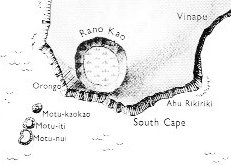
... On the twenty-fifth day [80 + 25 =
115] of the first month (Vaitu Nui),
Ira and Makoi set sail; on
the first day of June ('Maro'),
the bow of Ira's canoe
appeared
on the distant horizon, came closer and
closer on its course, and sailed along,
and finally (one) could see the (new
home) land.
The canoe reached the islets (off the
coast), and Ira saw that there
were three such islets. Ira said,
'Hey you, crew of young men, the vision
of Hau Maka, our father, which he
revealed to me, has come true. There are
'the handsome sons of Te Taanga,
who are standing in the water', for this
is the name that the dream soul of
Hau Maka gave them.
... he ui a Ira.ko te motu etoru.he
ki a Ira.he ro korua e kau a repa e ku ketu ana te
urunga.a Hau maka o to tatou matua.i hakahi mai ai kia
au.ko nga kope ririva tutuu vai a te taanga.te ingoa o
te motu ena etoru i nape ai e te kuhane o Hau maka. ...
(E:17) |
|
Tutu
1. Circle of fishing nets arranged in the
shape of a funnels or baskets. 2. To light a fire;
he-tutu i te ahi: to burn something. 3. To hit, to
strike, to beat. Tűt˙, to shake (something) clean
of dust or dirt; he-tűt˙ te oone o te nua, to
shake the dirt off a nua cape. Tutuhi, to
reject the responsibility for a mistake onto one
another, to blame one another for a mistake (see tuhi).
Tutuki, to stumble, to trip. O tutuki te va'e,
in order not to trip. Tutuma, firebrand,
partly burnt stick. Tuturi, to kneel. Vanaga.
1. To beat bark for cloth. PS Pau.,
Mgv., Mq., Ta.: tutu, id. Sa., To., Fu.: tutu,
id. 2. A broom, to sweep, to clean. Mq.: tutu, to
beat out the dust. 3. To shake, to winnow. Mgv.: tutu,
to tremble, to leap. Mq.: tutu, to shake. 4. To
kindle, to light, to ignite, to set fire, to burn. Mq.:
tutu, to burn, to set fire. 5. To stand;
hakatutu, to set joists. P Mgv., Mq.: tutu,
to stand upright. Ta.: tu, id. Tutua (tutu
1): board on which bark is beaten into cloth. PS Mgv.:
tutua, a cloth beater. Mq., Ta.: tutua,
wood on which cloth is beaten. Sa., Fu.: tutua,
id. Tutui: tutui ohio, chain, tutui
kura, shawl. Mq.: tuitui kioÚ, chain.
Tutuki: shock, contusion, to run against, to
collide; tukukia, to run foul of. P Pau.:
tukituki, to strike, to pound, to grind. Mgv.:
tukia, to strike against, shock, concussion. Mq.:
tutuki, id. Ta.: tui, id. Tutuma: 1. (tutu
- ma) a live coal. 2. Tree trunk T (? tumu).
Tutumata, ligament of the eye, orbit, eyelid. T (tutumate,
eyelid G). Tutuu, bristling. Churchill. |
|
Vai
Water, liquid, juice. 1. Vai tagata,
semen, sperm (also: takatea). 2. Vai kava,
saltwater, sea, ocean. Vanaga. (Sweet) water.
Vai-kura =
blood. Barthel.
1. Water, liquid, fluid, sap, juice,
gravy, fresh water as differing from tai
seawater; hakavai to dissolve, to liquefy, to
melt. P Pau.: ana-vai,
a brook. Mgv.: vai,
water. Mq.: vai,
water, liquid, juice. Ta.:
vai, sweet water, sap, juice.
Vaihu (vai-u),
milk. T Mq., Ta.: vaiu,
milk. Vaipuga
(vai-puna),
spring water. P Mgv.:
vaipuna, water which springs from among
stones. Mq.: vaipuna,
spring water. Ta.:
vaipuna, a spring.
Vaitahe (vai-tahe
1), river. 2. Pau.: Vai,
to exist. Ta.: vai,
to be, to exist. Vaiora,
to survive. Sa.: vaiola,
the spring 'water of life?' Ma.:
waiora, water
of life.
Vaitoa
(vai-toa 2),
sugar. Mgv.: vaito,
id. Vaituru (vai-turu
1), water conduit.
Vaivai, weak. PS Mq.:
vaivai, soft,
pleasant, agreeable. Sa., To.:
vaivai, weak.
Pau.: Vaiho,
to set down, to place. Ta.:
vaiiho, to place. Ma.:
waiho, to set
down. Pau.: Hakavaivai,
to delay. Ta.: vaivai,
to rest a bit. Ta.:
Vaianu, a plant. Mq.:
Vaimata,
tears. Ha.: waimaka,
id. Vaitahe,
a flood. Sa.: vaitafe,
a river. Ha.: waikahe,
running water, flood.
Vaitupu, spring water. To.:
vaitubu, well
water. Unuvai, to drink water; hipu unuvai,
drinking glass. Churchill.
Sa., Fakaafo, To., Fu., Niuē,
Uvea, Nukuoro, Ta., Rar., Tongareva, Mq., Mgv., Fotuna,
Nuguria, VatÚ: vai, water. Rapanui: vai,
juice, liquid, water. Aniwa: vai, tavai,
water. Ma., Ha.: wai, id. Sikayana: wai,
wuai, id. Vi.: wai, water. Rotumā: vai,
voi, id. Churchill 2. |
However, at the time of Gregory XIII the date ░June 1
(152 = 115 + 37) was when the Sun had reached Cursa, not the day
when the Sun reached Castor:
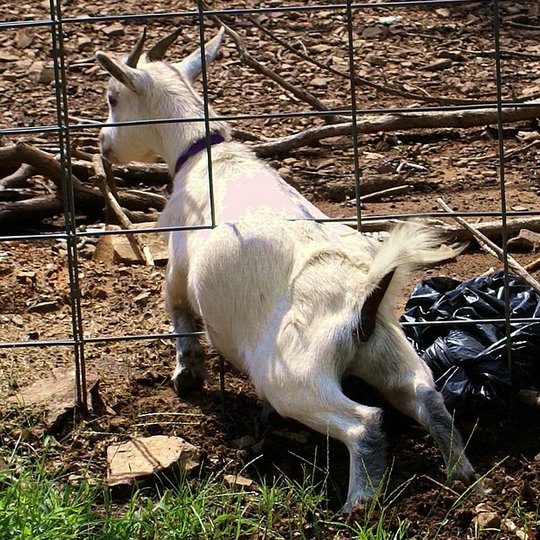
|
28 |
MAY 3 |
4
(124) |
5 |
6 (*46) |
7 |
 |
 |
 |
 |
 |
|
Ga2-13 |
Ga2-14 |
Ga2-15 (45) |
Ga2-16 |
Ga2-17 |
|
WEZEN
(Weight)
= δ Canis Majoris
(107.1), τ Gemini (107.7), δ Monocerotis (107.9) |
no star
listed (108) |
λ Gemini
(109.4),
WASAT
(Middle)
= δ Gemini
(109.8) |
no star
listed (110) |
ALUDRA
(Virgin)
= η Canis
Majoris
(111.1),
PROPUS = ι Gemini
(111.4),
GOMEISA = β Canis Minoris
(111.6) |
|
July 6 |
7 (188) |
8 |
9 |
10 (*111) |
|
░July 2 |
3 (184) |
4 |
5 |
6 (*107) |
|
'June 9 |
10 (161) |
11 |
12 |
13 (*84) |
|
"May 26 |
27 |
28 (148) |
29 |
30 (*70) |
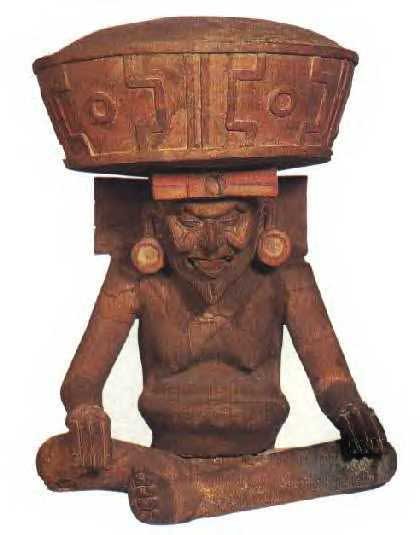
|
MAY 8 |
9 |
10 (130) |
11 |
12 |
13 (*53) |
 |
 |
 |
 |
 |
 |
|
Ga2-18 |
Ga2-19 |
Ga2-20 (50) |
Ga2-21 |
Ga2-22 |
Ga2-23 |
|
Ghost-23 (?)
ρ
Gemini (?) (112.1),
Eskimo
Nebula = NGC2392 Gemini
(112.2)
ANTARES (α
Scorpii)
|
Al Dhirā'-5
/
Punarvasu-7
/
Mash-mashu-Mahrū-10 (Western One of the Twins)
CASTOR =
α Gemini
(113.4) |
ANA-TAHUA-VAHINE-O-TOA-TE-MANAVA-7
(Pillar for
elocution)
υ Gemini
(114.0),
MARKAB
PUPPIS = κ Puppis
(114.7), ο Gemini (114.8),
PROCYON = α
Canis Minoris
(114.9) |
α
Monocerotis
(115.4), σ
Gemini (115.7) |
Mash-mashu-arkū-11
(Eastern One of the Twins)
κ Gemini
(116.1),
POLLUX = β
Gemini
(116.2), π
Gemini (116.9) |
AZMIDISKE =
ξ Puppis
(117.4) |
|
July 11 |
12 (193) |
13 (*114) |
14 |
15 |
16 |
|
░July 7 |
8 |
9 |
10 |
11 (*112) |
12 (193) |
|
'June 14 |
15 |
16 |
17 (168) |
18 |
19 (*90) |
|
"May 31 |
Maro 1 (*72) |
2 |
3 (154) |
4 |
5 |


Counting half a year ahead from heliacal Wasat
will bring us to the opposite pole, to glyph 227 (= 45 + 364 /
2) and to the place of Aladfar in Lyra:
|
NOVEMBER 1 |
2 (306) |
3 (*227) |
4 |
5 |
 |
 |
 |
 |
 |
|
Ga8-22 |
Ga8-23 |
Ga8-24
(227) |
Ga8-25 |
Ga8-26 |
|
19h
(289.2)
λ
Aquilae (Ant.) (289.1), γ Cor. Austr (289.3),
τ
Sagittarii
(289.4), ι Lyrae (289.5), δ Cor. Austr. (289.8)
|
Al
Baldah-19
AL
BALDAH = π Sagittarii,
ALPHEKKA MERIDIANA = α Cor. Austr.
(290.1),
β Cor. Austr. (290.2) |
ALADFAR
(The Talons of the Eagle)
= η Lyrae
(291.1),
NODUS II
= δ Draconis
(291.5), ψ Sagittarii (291.6), τ Draconis (291.7), θ
Lyrae (291.8) |
ω
Aquilae (292.1),
ρ
Sagittarii
(292.6),
υ Sagittarii (292.7) |
π
Draconis,
ARKAB
PRIOR = β╣ Sagittarii
(293.0),
ARKAB
POSTERIOR = β▓ Sagittarii,
ALRAMI
(The Archer)
= α Sagittarii
(293.2),
χ
Sagittarii
(293.6) |
|
January 4 |
5 (*290) |
6 |
7 (372) |
8 |
|
░December 31 |
░January
1 |
2 |
3 (*288) |
4 |
|
'December 8 |
9 |
10
(*264) |
11 (345) |
12 |
|
"November 24 |
25 (329) |
26
(*250) |
27 |
28 |
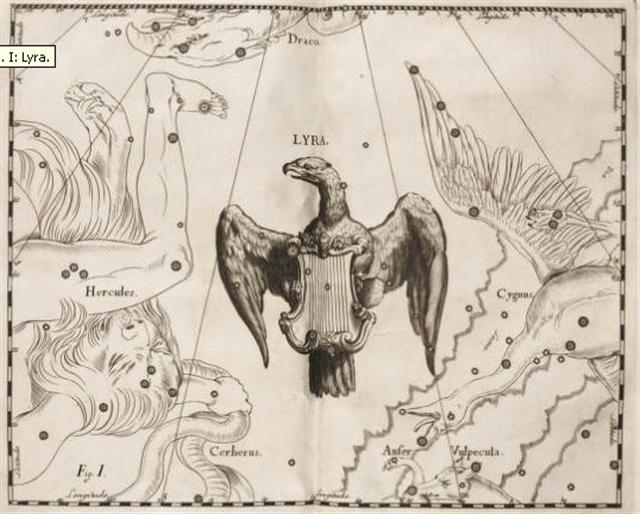
It could have motivated why Castor (the
mortal one of the Twins) traditionally was pictured
with such a string instrument:

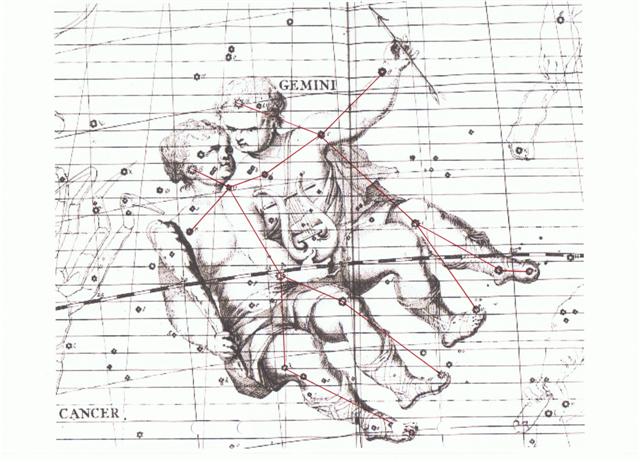
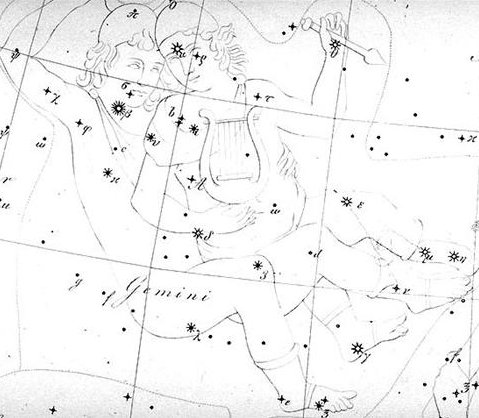
Although this was impractical for Hevelius
who saw the figures from the outside of his sky globe.
Instead he could have alluded to the string instrument by showing
Castor wielding a
cat o' nine tails whip:
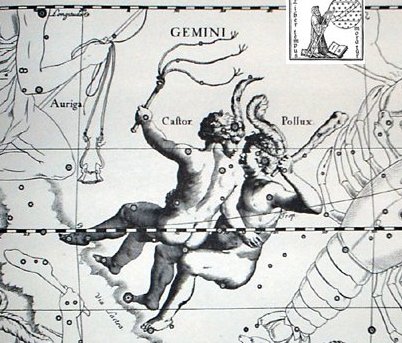
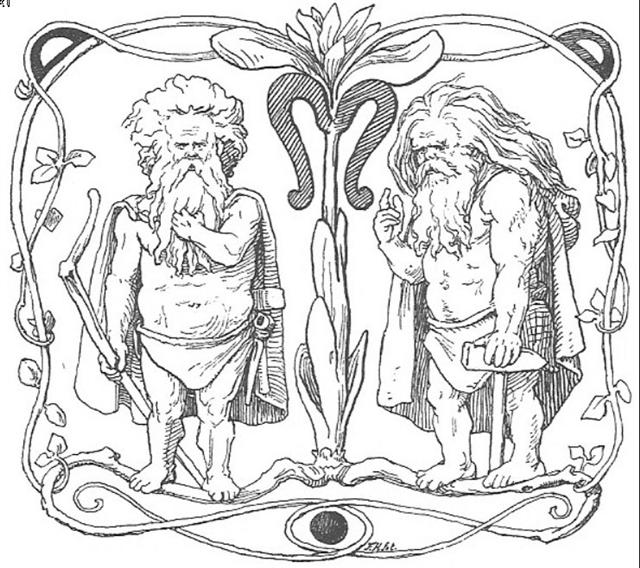
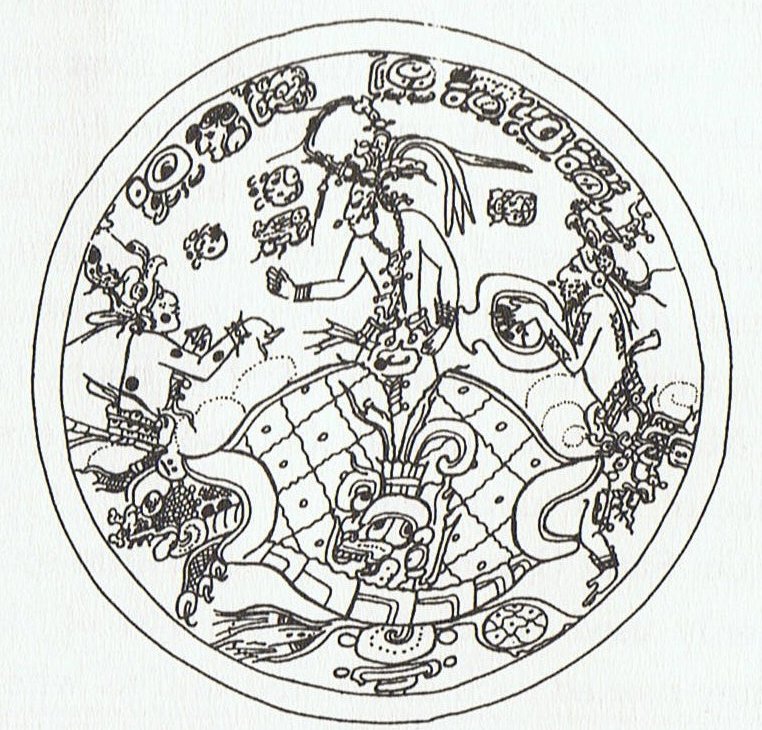
|






















